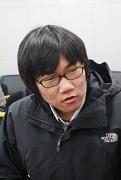Yonseians' thoughts on Korean reunification
TENSIONS ON the Korean peninsula flared anew earlier this year with the "preemptive strike" remark* made by South Korean Defense Minister Kim Tae-young. North Korea's criticism of Kim's comment followed, calling Minister Kim's remark an "open declaration of war." The current state of the inter-Korean relationship remains on a knife-edge, as shown in the recent military confrontations. Furthermore, the problems of North Korea's nuclear weapons and human rights record also raise doubts about the feasibility of reunification. With the inter-Korean relationship fluctuating constantly, The Yonsei Annals asked about Yonseians' thoughts on the reunification of Korea.

There is no doubt that the two Koreas should be reunified, and I think the sooner the better. This is because the sorrows of separated families outweigh the differences in political ideologies. It has been more than 50 years since the Korean War, and the remaining separated families are disappearing into the mist of history. Therefore, the state of cessation should end before this weak link between South and North disappears completely. Moreover, North and South Koreans are compatriots who share the same cultural and historical backgrounds. If the current state of the inter-Korean relationship continues, however, the two Koreas will not be able to close the gap in the end. Even now, people feel unfamiliar with North Korean language or culture. I hope the government would take more notable steps, such as holding an inter-Korean summit.

I am afraid that the influx of 20 million people from the North would worsen the present unemployment crisis. Also, as many North Koreans are not educated properly, and thus likely to be poor at handling tasks, the overall quality of the workforce would decrease. Moreover, the difference between the living standards of North and South Koreans would foster an atmosphere of social disharmony, leading to social unrest. The biggest problem after reunification would be ideological differences between North and South Koreans, due to the diplomatic cessation after the Korean War. For example, South Koreans are accustomed to capitalistic ideology, while North Koreans have been infused with communist ideas. In that case, conflict among Koreans would be unavoidable when they work together under the same system. It has been more than 50 years and putting the two Koreas back like when they were one nation is nearly impossible.

There is a tremendous gap between the two Koreas in terms of economic status. It is obvious that North Korea will need economic support from the South for constructing buildings or establishing a social welfare system, which will overburden South Koreans with skyrocketing taxes. What is more, I think North Korea is ignoring South Korea's efforts to be compatible with the North. They often shut diplomatic routes, declining to resume talks or sit at the multinational negotiating table. The North has also played dangerous games of brinkmanship, threatening the international community with nuclear weapons, despite South Korea's provision of food and fertilizer to North Korea. I think the North's attitude makes it more and more difficult to dream about the reunification of Korea.

People in the 1980s-1990s were highly interested in reunification, regarding it as a grand duty given to the Korean race. However, young people these days do not really take this issue seriously, as they are busy dealing with personal issues, such as building so-called specs. However, the irony is that if young people truly care about their future and their career as well, they should be concerned more about reunification. If reunification comes, infinite opportunities would be created for the youth. The demand for professional jobs, such as teachers, lawyers or accountants, would increase sharply because of new industries in the North. Also, Korea would be able to broaden its diplomatic perspective from inter-Korean issues to international ones. At present, the South Korean government cannot voice its opinion when it comes to Japan's distortion of history nor argue fiercely on the Dok do issue, since cooperation with Japan is essential to a successful arrangement of the Six Party Talks. The same situation goes for China, as it is one of the countries that can influence the North's rash diplomatic actions. If the North Korean issue keeps preventing the Korean government from dealing with other diplomatic matters related to crucial national interests, Korea will never realize the dream of national prosperity nor join the ranks of advanced nations.

I have a strong faith that Korean reunification is an unavoidable destiny of the Korean people. If it becomes a reality, I can meet my family in the North, whom I long for. Also, the adverse political and economic situation of the North might be improved, so that North Koreans who have lived in a backwater can live in a more humane society. Now, North Koreans know that their living environment would get better if the hermit regime of North Korea collapses and it becomes an open society like South Korea. Yet there are many obstacles hindering reunification. Young people in South Korea do not seem to be so interested in inter-Korean issues. Furthermore, other powerful nations do not welcome our reunification, since they are afraid of the emergence of a new, powerful nation with great economic and military strength.
*"preemptive strike" remark: South Korean Defense Minister Kim Tae-young's statement at the local defense forum on Jan. 20, saying that the South should launch a pre-emptive strike right away against North Korea if there is a clear indication the country was preparing a nuclear attack.
*Sae tomin: Literally meaning "new settlers," it generally indicates North Korean defectors living in South Korea.

